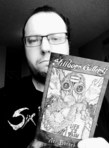Axl Barnes's Blog, page 3
May 8, 2023
Neighborhood Morbidity Watch
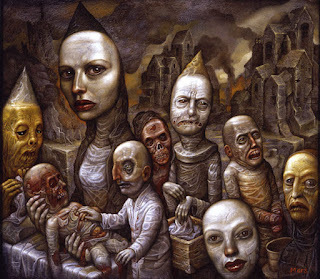 Picture by Chris Mars
Picture by Chris Mars
The two obese brothers cackled as they threw bricks at each other.
On the street, some guys played soccer with a cat
filled with sand,
while others used sparrows and rocks
as tennis balls.
Cars kept passing by, now and again,
a monotone procession,
driving the faceless from work.
Car horns and swears slashed the dusty daylight.
On the playground, George stopped swinging,
and injected mud into his forearm.
On the front stairs to my cubical apartment building
John was getting a frantic bj
from his chubby girlfriend
as he stroked his favorite stray dog.
At the place across the street,
Tudor and his gang were gathered
around a broken cellar window
throwing in firecrackers
and lighted cigarette butts.
Screams and guffaws
cut into the evening’s
jaundiced underbelly.
Up on the second floor,
Mr. Sharp took long puffs from his smoke,
face twisted in a scowl,
soccer game commentary
blasting from inside.
His wife-beater was stained with blood.
I walked to the gray building next to mine.
Old Dick was doing his thing
Climbing between the opposing walls of the two places,
Hands against one, feet against the other.
He got to the first floor, shaking,
Face red with strain.
A small group of fans looked up,
Mouths agape.
The ponytailed girl with a short leg
counted for hide and sick
as the Siamese twins
hid behind the abandoned car on bricks.
Inside, Andy “Fathead” went “Vroom-vroom-vroom.”
Angela was at the usual spot,
On the stairs around the corner,
Talking about a telenovela
with the brown and chubby midget woman.
Angela ruffled my curly hair.
“My handsome lil’ prince,” she said.
I sat next to her, began eating sunflower seeds,
and caught glimpses of her generous cleavage,
and the tender skin under her flowery dress.
Her hairy warmth was as salty as the seeds in my mouth.
Angela’s husband was in jail,
and her boy was subnormal, housebound,
with a leaking eye.
To the west, beyond the tops of the drab buildings,
the sky was bloodied and bruised;
the night would be warm and wet
like a festering wound.
May 2, 2023
Deep Down Necrosis
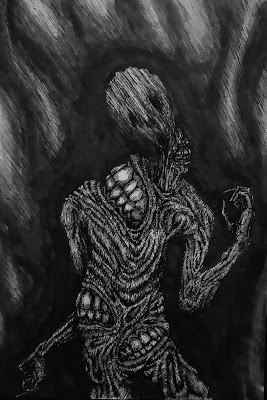 Dysmorph by
Brendan McCarthy
I scrape off your face,
Dysmorph by
Brendan McCarthy
I scrape off your face,
your plastic smile,
like tooth decay.
Through the cavity hole
I press on the wormy tangle
of upchucked nightmares
and leftover words,
but those nerves are too spent
to carry electricity.
The impulse floats
like a dead fish in a murky pond.
The yellow, fermenting pus
of your resignation
stains my gloved fingers,
And it reeks of abandoned theaters
turned squatter houses.
You’re but a wrinkled mask
stretched over a swamp,
bubbling with rot.
Your screams gargle like clogged drains.
Your gums are mush,
no bone, no story.
All we can do for you is cover the gray ruin deep down
with a waxy ruin,
and hope for a good embalmer.
April 14, 2023
Review of David Peak's Corpsepaint
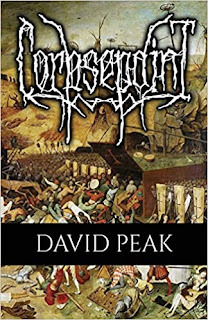 David Peak’s Corpsepaint is a treat for black metal fans and readers of cosmic horror. As I count myself in both these categories I fully enjoyed this book. Peak’s writing is concise and penetrating, poetical yet punchy, he does an amazing job describing physical and psychological decay and degradation, suggesting pessimism, hopelessness, and damnation. The tone of the book reminded me of B.R. Yeager’s Negative Space as well as the atmospheric horror movie The Witch. Peak is good at conveying the heaviness of a curse, the moral paralysis of being forsaken by a god. His descriptions of the transfigurative power of music come close but don’t match those of another champion of cosmic horror, Curtis L. Lawson, in Black Hearts Boys Choir.
David Peak’s Corpsepaint is a treat for black metal fans and readers of cosmic horror. As I count myself in both these categories I fully enjoyed this book. Peak’s writing is concise and penetrating, poetical yet punchy, he does an amazing job describing physical and psychological decay and degradation, suggesting pessimism, hopelessness, and damnation. The tone of the book reminded me of B.R. Yeager’s Negative Space as well as the atmospheric horror movie The Witch. Peak is good at conveying the heaviness of a curse, the moral paralysis of being forsaken by a god. His descriptions of the transfigurative power of music come close but don’t match those of another champion of cosmic horror, Curtis L. Lawson, in Black Hearts Boys Choir.Now, something nagged me while reading Corpsepaint and I think it points to some tensions in the thinking behind the work. Nerding out alert! Black metal clusters together a number of extreme ideologies that are sometimes at odds with each other. With his seminal early albums, Varg Vikenes, the man behind Burzum, influenced Satanic Black Metal (SBM), National Socialist Black Metal (NSBM), as well as Depressive Suicidal Black Metal. Other central acts of second-wave BM like Darkthrone and Mayhem displayed both Satanic and NS sympathies. However, Erik Danielson from Watain is careful in separating the two. "Racial ideas, to me -- from my perspective as a spiritual person -- are really irrelevant. I study other cultures, and I'm interested in radical ideas of viewing the world, but when it comes to racial ideas, I've never really found a speech or text about it that could make sense to me. When we view the world from a spiritual perspective, racial ideas become very mundane, and insignificant. We are talking about an animal that developed into man and that is, to me, where my primary enemy lies. Not in any specific kind of that animal. We are all that animal, and I am completely uninterested in any ideas contrary to that, to be honest."
The anti-human impetus behind acts like Watain, Funeral Mist, or Inquisition, the satanic desire for liberation and transcendence of human nature is in conflict with any narrow interest in race or the war between races.
These tensions amongst BM ideologies are reflected in Corpsepaint and the world-views of the main characters. Max and Roland are rebels without a cause marching on a path to self-destruction. “Black metal is not for well-adjusted people,” Max thinks. “Hard drugs and corpsepaint are symptoms of the same disease.” On the other hand, Seph is more into the NS, land and blood side of things. She is dedicated to her community and the preservation of its heritage, something reminiscent of Varg Vikernes’ eurocentrism, except Seph is more focused on her pure Ukrainian heritage and blocking out any Russian contamination, and the decadent modern world in general. (David Peak proves to be a bit of a visionary here, given the war between the two countries that started last year.)
Now we finally get to what’s been nagging me about this book. Seph doesn’t believe in Odininsm or something that fits NS ideology, but in the Lord Leviathan, which sounds a lot like a god of death and destruction, something that a Satanist would worship. In other words, a god that doesn’t care about races, but is out to destroy all of humanity. Let’s take a closer look at how Leviathan is introduced:
Seph states, “He clears the path to ascend and wages war on the primordial being -- chaos itself, the bornless one -- unleashing the black miasma that covers the world. The war is long and it is difficult, but ultimately the Lord is crowned the victor. He becomes the all-knowing, ever-seeing protector of our lands. From that day forward, He reigns supreme as the Lord of the lords, ruler of the Black Sea, and bringer of peace. And we are all his children. His blood is our blood, the blood of the land’s firstborn son and daughters. He provides the air we breathe, the food we eat, and in doing so, he lives forever within each of us. And in death we return our bodies to the earth, joining our flesh to his flesh, the Lord Leviathan.”
Initially, I was tempted to interpret this through the lens of the Sumero-Babylonyan myth of the goddess Tiamat, the primordial chaos, who was defeated by Marduk. However, Tiamat, being bornless, is also deathless and one cannot kill what is already dead. Thus, even though Marduk proceeds to create the world and mankind, he cannot fully extinguish the principle of chaos that slowly penetrates the created universe and eventually brings about its destruction. So, in this interpretation, Leviathan would be the equivalent of Marduk, a creator god, a god of order, which fits the description of him as “bringer of peace.” Although, even on this view, it’s unclear why Leviathan favors one race or nation (Ukrainians, in this case) over others. The god seems to have local and universal attributes, making its nature difficult to grasp. Incidentally, this is also an ambiguity in the nature of the Christian god, who is both the god of the Jewish people and the god of humanity as a whole.
But even this line of charitable interpretation is called into doubt when, on the next page, Leviathan is characterized as “formless,” “the black and unknowable abyss that surrounds our world,” “the darkness between the stars,” “always at war with others like him.” These attributes again call to mind the goddess Tiamat, the dark mother of chaos, rather than Marduk, the creator. Moreover, Leviathan’s plan turns out to be the destruction of everything. He shows no mercy to his own people, those of his blood, he’s just ready to swallow the world. However, in an NS framework, one would expect that the creator God would favor one race over others or people exemplifying certain virtues like courage or loyalty, over cowards or cheats. That’s why Odinism and the promise of Valhalla are a good fit for an NS outlook. But there’s no Aryan paradise awaiting the followers of Leviathan, both believers and non-believers are turning to ashes and dust.
We may note that, like many ancient gods, Leviathan has a dual nature; he’s torn between opposites, creator and destroyer, bringer of peace and war, local as well as universal. But this unclear and paradoxical nature makes him a bad story character as the reader has no clue what he is exactly and this drains the emotional oomph of the narrative and its overall cogency.
Nerding out stops here. All in all, mythological discussions aside, I truly enjoyed Corpsepaint and its portrayal of music as an act of transcendence, liberation, and transfiguration. As Mortuus from Funeral Mist writes, "I choke the human within, to gain the will of a god."
March 1, 2023
The Loser (Ode to Emil Cioran)
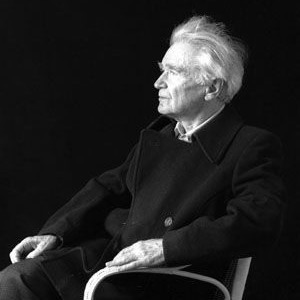 I resigned from humanity,
I resigned from humanity,and applied for the job
of full-time ghost.
Raging hormones
made me hang up my cleats, and exile myself in libraries to quench my thirst for losing.
I painted graffiti with my cum
on bathroom stalls
in the language of boredom.
Even as a ghost I was shy and clumsy,
couldn’t perform a decent haunting,
a small part in a nightmare,
or even a mildly unsettling apparition;
I was mostly slacking, killing time,
In the backrooms of the night.
Being a ghost ended up scaring me,
haunting me,
stressing me out.
Naturally, I’ve been demoted from full-time ghost
to casual phantom,
but even that minimal responsibility mortified me.
Next step, I quit being a specter altogether,
and pursued a fulfilling career in nonexistence
February 20, 2023
Dementia Games
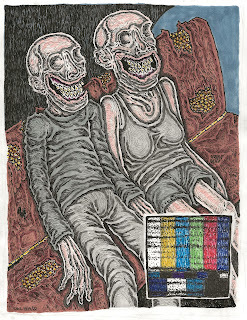
The two grandparents play hide and seekwith their meds and memories,
inside their cabin,
at the heart of a distant winter.
Surrounded by mountains of fog,
they pet their broken catsand play fetch with their frozen dogs.
They play makeup with feces
and formaldehyde.
The holes in their brains are for their children,
and the depressions in their bleeding gums
are for their grandchildren.
But the thieving wind stole their marbles,
and they can only count between zero and minus,
between nobody and gray. Their children are unconcerned:
the two loved each other
and have passed away together,
hugging.
No one deserves to die alone!
January 27, 2023
Cemetery with Falling Teeth (vignette)
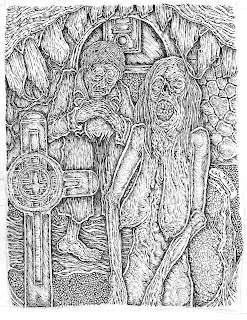 Illustration by
Thomas Stetson
I was on my way to school on that ashen morning when my teeth started coming loose. My backpack was too heavy and my head bowed down. I spit out a tooth and it landed in a puddle of mud at my feet, its white like ice, like hail. I swallowed the next ones out of fear and shame. I avoided biting and kept my mouth slightly open, but my tongue was restless and it kept pushing at them. On my way, I met two of my classmates, my usual companions, and gave them a tight-lipped smile. They weren’t talking much anyway, burdened by their packs, not fully awake. It was foggy and started to drizzle. We made our way down the familiar streets, between the usual gray apartment buildings, mud sticking to our boots, as heavy as silence.
Illustration by
Thomas Stetson
I was on my way to school on that ashen morning when my teeth started coming loose. My backpack was too heavy and my head bowed down. I spit out a tooth and it landed in a puddle of mud at my feet, its white like ice, like hail. I swallowed the next ones out of fear and shame. I avoided biting and kept my mouth slightly open, but my tongue was restless and it kept pushing at them. On my way, I met two of my classmates, my usual companions, and gave them a tight-lipped smile. They weren’t talking much anyway, burdened by their packs, not fully awake. It was foggy and started to drizzle. We made our way down the familiar streets, between the usual gray apartment buildings, mud sticking to our boots, as heavy as silence.There was construction on one of the streets. Beyond the orange barricades, the street was now a giant crater, extending to the foundation of one of the structures. Was that building sinking slowly? I couldn’t tell for sure, but it didn’t look straight. When we negotiated our detour I remembered I had to recite a poem in class. My heart sank. How was I to recite with no teeth? I’d be a laughingstock. Panicked, I lagged behind my classmates and darted inside one of the buildings. I ran up the steps to the top floor and huddled up in a corner, my tongue still working at dislodging my front teeth. Doors opened and closed below me, steps descended, whispering shadows, people going to work.
I waited as more teeth fell. Their roots snapped and sent jolts to my brain, like earthquakes just behind your eyes. I pressed my lips tight and fought back tears.
When I felt that the class has started I went out on the muddy streets, my legs unsure where to take me. I couldn’t go back home. My mom would yell at me for skipping school and losing all my teeth. She’d say I must be contaminated and would take me to the hospital, leaving me there with strangers, needles, and scalpels. Those green walls and nauseating smells, the eternal waiting. It was worse than being on the playground when no one wanted to play with you. The hospital was a deserted playground with barbed wire.
I found myself in the cemetery. The rain picked up, hard. Through the deluge, I saw a hole waiting in front of a marble cross. The earth under it softened, and the cross started to lean over. Finally, it fell inside the muddy hole with a wet thud, just as I spit out my last tooth.
October 5, 2022
July 24, 2022
Review of Curtis Lawson's The Envious Nothing
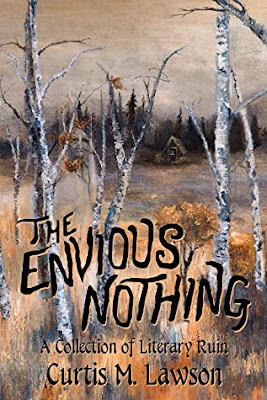 I remember having high expectations for Curtis Lawson's The Envious Nothing. They were surpassed
I remember having high expectations for Curtis Lawson's The Envious Nothing. They were surpassedand pulverized. This is a rare treat for horror fans as Lawson expertly integrates elements of body horror, psychological horror, folk, and supernatural horror in a style firmly rooted in Lovecraftian cosmic horror. In his earlier volume, Black Pantheons, Lawson claims that "Cosmicism is a literary philosophy that suggests we live in a vast, indifferent universe, devoid of any cosmic father figure. If you take it a bit further it is the view that the universe and any higher intelligence within it, is actually malevolent in nature." That early volume features many stories of trickster demons and other supernatural entities bent on torturing humans both physically and mentally.
In Devil's Night and The Envious Nothing, Lawson departs gradually from that initial characterization of cosmicism and offers a more complex picture of human nature and its relationship with the supernatural. There's a certain moral ambiguity that permeates some of these stories. In "Orphan" or "The Rye-Mother" the main characters are misfits who want to find a place to belong, a place outside the confines of the ordinary world, and beings from beyond the natural order offer their help. In addition, evil becomes more diffuse, so much so it turns into nothing, but it's a dynamic and dangerous Nothing. Lawson doesn't go as far as B.R, Yeager in Negative Space, to strip these otherworldly forces of any human characteristics. Nothingness is described as envious, hungry, vengeful, although those properties are immense and grotesque in comparison to their human counterparts. Lawson here echoes ancient creation myths from the Sumero-Babylonian to the Norse traditions. The goddess Tiamat is famously described as a primordial abyss, beyond space and time, life and death, both life-giving and vengeful and destructive. By introducing Nothingness as a malevolent force Lawson takes us to the limit of our conceptual scheme, to the realm of paradox, the point where ancient mythology merges with modern physics. If Nothing is envious isn't it Something? Isn't envy a property or a predicate that requires a subject, a substance to have it? How can something be envious while outside space and time? Don't emotions have duration, a certain feel to them? Lawson's power as a horror writer lies in being able to weave imaginative, evocative stories around these perennial cognitive cramps and conceptual dead-ends, and to vividly express that which cannot be told.
I enjoyed all stories in this volume as the author not only spins original tales but uses a variety of literary techniques and forms to deliver them. The reader is never bored and kept on his toes. Stories like "Elvis and Isolde" are so well-crafted that you probably need a strong cup of coffee before delving into them. The stories that will remain tattooed on my brain are "The Happiest Place on Earth" (it reads like a mix of Stephen King's The Mist and The Girl who Loved Tom Gordon, steeped in deep, thick melancholy), "Secretes of the Forbidden Kata," The Rye Mother" (I have a soft spot for amoral elitist characters and the imagery is stunning) and "The Truth about Vampires," (this one's aggressive weirdness and demented depravity reminded me of Nicole Cushing's "Mr. Suicide") As a small lament, I think some of these stories deserved a larger canvass, maybe a novella or even novel treatment. For instance, "Monsters have no Place in the World to Come," a story about the Hitler Youth, could easily grow into a novel in the vein of Lord of the Flies set against the desolate background of a ruined Berlin. All in all, I warmly recommend this darkly beautiful and challenging book!
June 15, 2022
The Barren Clock (poem)
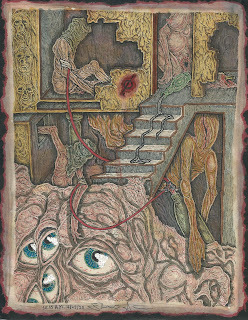 Trap House by Foul Apparatusbetween meat and pharmacy, four vaginas grew around the center of the large clock as its hands turned into scalpels. Blood leaked while the openings throbbed and stretched. Newborns were pressed out like meat from a grinder. Some were sliced in half, the tops dropping on the floor, the bottoms dangling from umbilical cords.
Trap House by Foul Apparatusbetween meat and pharmacy, four vaginas grew around the center of the large clock as its hands turned into scalpels. Blood leaked while the openings throbbed and stretched. Newborns were pressed out like meat from a grinder. Some were sliced in half, the tops dropping on the floor, the bottoms dangling from umbilical cords. A crowd of customers and workers gathered around the bizarre manifestation, screaming and crying, asking for the police or an ambulance. But there was nothing to save, no one to put behind bars. The newborns, even the whole ones, were already dead; or, as some witnesses speculated, trapped in a limbo between life and death not yet explored by medical science. Coated in mucus streaked with blood, the abominations had clumps of gray hair, patching their brown, shriveled heads. Their milky eyes stared vacantlyfrom folds of wrinkled skin like crumpled grocery bags. Brown mouths emitted a cacophony of sounds, from the shrill cries of a baby to moans, groans, and death rattles.Paralyzed fingers still held faded name tags or ID cards protecting their deflated chests. The insides of the ones cut in half by the blades of the clockwere yellowed dusty newspapers, rotten food chocked by ashen and green layers of mold, and slithering clumps of phone cords, electronic cables, and vacuum cleaner hoses. The morbid apparitions convulsed on the flooratrophied arms moving defensively as if their decayed minds flashed with savage beatings; stillborn trapped in an epileptic dance their parchment skin slapped and grimed the tiled floor. Theories abounded: zombies? curses? portals to hell? aliens?
Whatever the explanation, people knew they wanted nothing to do with the disturbing sight. As the mall was already unprofitable, the owners closed the store, bricked up and plastered the exits, out of sight out of mind.
But the legend of the Grinding Clockcontinued to haunt the tomb-like structure. Some reported hearing gargled screams and seeing a fetid sludge seeping through the wall. Parents complained their kids skated in the parking lotonly to return home as old men, their minds cracked. Drivers would crash their vehicles full-speed into the outside wall, while passersby would eat from the nearby dumpster with feral abandon their teeth breaking on bits of discarded fixtures or rusted appliances, throats and stomachs lacerated and pierced by shards of plastic and glass. One evening and I saw this with my own eyes, a girl was riding her bike in the empty parking lot when the pedals started rotating at full speed, becoming hungry blades, and biting into her white sneakers, ripping the muscles, bones, and tendons of her feet. The girl gave a short, shrill scream and fell to the pavement. As if possessed, she began crawling toward the mall painting the asphalt red with brushes of shredded meat.Her arms turned to crotches hitting the pavement with a hollow, frantic, sound and dislocated from her shoulders. Her blond locks became thick dust covering her shrinking skull. Strong gusts of dirt swept the deserted lot rolling her like tumbleweed, tender flesh battered and ripped, while her tiny bones scattered on the ground. Soon she lost all substance, her pink dress turned into a pink plastic bag and the wind plastered it against the wall of the cursed store, opened it like a wound,bleeding, throbbing, dilating.
January 18, 2022
Easy Meat (short poem)
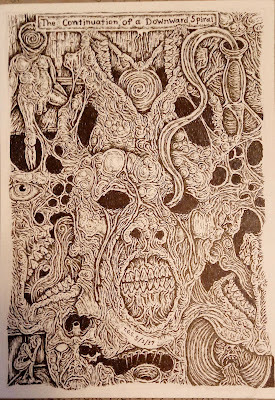 Picture by
Foul Apparatus
The hands of the clock tore our chests
Picture by
Foul Apparatus
The hands of the clock tore our chests and wrung out the blood.
Now we're just alabaster hulks of meat,
blindly pushing against each other,
begging in a language of cold mist and quicksand,
for something forgotten.
Easy meat dangling on hooks, mummified in plastic.
Like boxers clenching in the last round,
all deaf but waiting for the bell,
and dreaming
of dried-up kids drowning
in a dried-up river.

